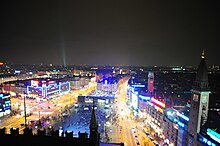Portal:Business
The Business and Economics Portal Business is the practice of making one's living or making money by producing or buying and selling products (such as goods and services). It is also "any activity or enterprise entered into for profit." A business entity is not necessarily separate from the owner and the creditors can hold the owner liable for debts the business has acquired. The taxation system for businesses is different from that of the corporates. A business structure does not allow for corporate tax rates. The proprietor is personally taxed on all income from the business. A distinction is made in law and public offices between the term business and a company such as a corporation or cooperative. Colloquially, the terms are used interchangeably. (Full article...) Economics (/ˌɛkəˈnɒmɪks, ˌiːkə-/) is a social science that studies the production, distribution, and consumption of goods and services. Economics focuses on the behaviour and interactions of economic agents and how economies work. Microeconomics analyses what's viewed as basic elements in the economy, including individual agents and markets, their interactions, and the outcomes of interactions. Individual agents may include, for example, households, firms, buyers, and sellers. Macroeconomics analyses the economy as a system where production, distribution, consumption, savings, and investment expenditure interact, and factors affecting it: factors of production, such as labour, capital, land, and enterprise, inflation, economic growth, and public policies that have impact on these elements. (Full article...) Selected article
A photograph of traders on the New York Stock Exchange floor in 1963
Capitalism is an economic system in which the means of production are privately owned and operated for profit, usually in competitive markets. Income in a capitalist system takes at least two forms, profit on the one hand and wages on the other. There is also a tradition that treats rent, income from the control of natural resources, as a third phenomenon distinct from either of those. In any case, profit is what is received, by virtue of control of the tools of production, by those who provide the capital. Often profits are used to expand an enterprise, thus creating more jobs and wealth. Wages are received by those who provide a service to the enterprise, also known as workers, but do not have an ownership stake in it, and are therefore compensated irrespective of whether the enterprise makes a profit or a loss. In the case of profitable enterprise, profits are therefore not translated to workers except at the discretion of the owners, who may or may not receive increased compensation, whereas losses are not translated to workers except at similar discretion manifested by decreased compensation. (Full article...) Selected image
Selected economyThe economy of Denmark is a modern high-income and highly developed mixed economy. The economy of Denmark is dominated by the service sector with 80% of all jobs, whereas about 11% of all employees work in manufacturing and 2% in agriculture. The nominal gross national income per capita was the ninth-highest in the world at $68,827 in 2023. Correcting for purchasing power, per capita income was Int$57,781 or 10th-highest globally. The income distribution is relatively equal but inequality has somewhat increased during the last decades. In 2017, Denmark had the seventh-lowest Gini coefficient (a measure of economic inequality) of the then 28 European Union countries. With 5,932,654 inhabitants (1 January 2023), Denmark has the 38th largest national economy in the world measured by nominal gross domestic product (GDP), and the 52nd largest in the world measured by purchasing power parity (PPP). (Full article...) Selected quote"That part of the thing which he is only just induced to purchase may be called his marginal purchase, because he is on the margin of doubt whether it is worth his while to incur the outlay required to obtain it. And the utility of his marginal purchase may be called the marginal utility of the thing to him. Or, if instead of buying it, he makes the thing himself, then its marginal utility is the utility of that part which he thinks it only just worth his while to make. And thus the law just given may be worded: —The marginal utility of a thing to anyone diminishes with every increase in the amount of it he already has. There is however an implicit condition in this law which should be made clear. It is that we do not suppose time to be allowed for any alteration in the character or tastes of the man himself. It is therefore no exception to the law that the more good music a man hears, the stronger is his taste for it likely to become; that avarice and ambition are often insatiable; or that the virtue of cleanliness and the vice of drunkenness alike grow on what they feed upon. For in such cases our observations range over some period of time; and the man is not the same at the beginning as at the end of it. If we take a man as he is, without allowing time for any change in his character, the marginal utility of a thing to him diminishes steadily with every increase in his supply of it." TopicsRelated WikiProjectsDid you know (auto-generated) -
On this day in business history
General imagesThe following are images from various business-related articles on Wikipedia.
More did you know
Business news Wikinews Economy and business portal
|








































